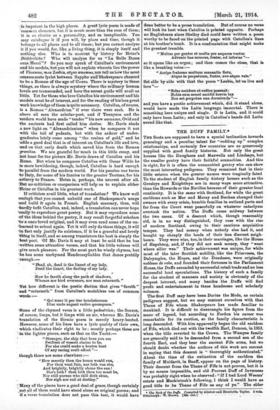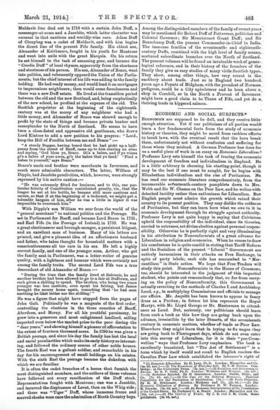THE DUFF FAMILY.*
THE Scots are supposed to have a special inclination towards genealogy and a peculiar talent foe " redding up" complex relationships, and certainly few countries are so generously supplied with good family histories. Not only the great houses like the Douglases and Maxwells and Lindsays, but the smaller gentry have their faithful sennachies. And this is right, for it is often the unennobled gentry who can show the most interesting pedigrees They remained fast in their little estates when the greater names were tragically fated To the student a English family history houses such as the -Gresleys and Knight/eye are in many ways more attractive. than the Howards or the NeviLles because of their greater local continuity. It is the same with Scotland, for while the great ear/doms such as Mar and Moray and Buchan °hanged their owners with every crisis, humble families in outland parts and far from the Court went peacefully on whatever cataclysm overtook the nation. The Duffs come midway between the' two asset. Of a descent which, though reasonably old, -is in no way distinguished, they rose with the rise of modern Scotland, owing to their cautions acquisitive temper. They bad money when nobody else had it, and bought up cheaply the lands of their less discreet neigh- bours. They were wise, too, in their marriages, like the House of Hap:dm:mg, and, if they did not seek money, they "went where faller was." Their achievement was unique, for while most of the later Scottish nobility, like the Primroees, the Dalrymples, the Hopes, and the Dumdums, were originally noblesse tie robe, and founded their fortunes in the Parliament House, the Duffs ascended by successful retail trade and no less successful land speculations. The history of such a family for the student of manners and society is obviously of the deepest interest, and many besides the Duffs will find profit and entertainment 'in these handsome and scholarly volumes.
The -first Duff may have been Darius the Mede, as certain pedigrees suggest, but we may content ourselves with that Thane of Fife whom Shakespeare has made familiar to Mankind. It is difficult to disentangle his figure from the maze • of legend, but Recording to Fordun his career was remarkable for its caution, so the family characteristic is long descended. With Min apparently began the old earldom of Fife, which died out with the twelfth Earl, Duncan, in 1353, -when the title reverted to the Crown. The Wemyss family are generally said to be descended from a second son of the fourth Earl, and they bear the ancient Fife arms, but we should doubt whether the authors of this work are comet in saying that this descent is " thoroughly authenticated." About the time of the extinction of the earldom the family of Muldavit, in Banff,•appear on the page of history. Their descent from the Thane of Fife is net proven, but it is by no means impossible, and old Provost Duff of Inverness was probably right when he observed: "If I bad Lord Weems' estate and Mackintosh's following, I think I would have as good title to be Thane of Fife as any of ye." The elder • no Book of the Dula Compiled by Alistair and Henrietta Tayler. 2 TO& Edinburgh : W. Brown. Eits not.) Muldavit line died out in 1718 with a certain John Duff, .a messenger-at-arms and a Jacobite, which latter character was unusual in that cautious and worldly-wise race. Adam Duff of Clunybeg was . a cadet of Muldavit, and with hint begies the direct line of the present Fife family. His eldest son, Alexander of Keithmore, fought in his youth for Montrose and went into exile with the great Marquis. On his return he set himself to the task of amassing gear, and became the Oreelie Duff" of local rhymes, apparently from the shortness and stoutness of his person. His son, Alexander of Brace, went into politics, and-vehemently opposed the Union of the Parlia- ments; but the chief interest of his life was adding to the family holding. He had ready money, and would lend it on mortgages to impecunious neighbours; then would come foreclosures and there was a new Duff estate. He lived at the transition period between the old and the new Scotland, and, being emphatically of the new school, he profited at the expense of the old. The Scottish proprietor at the beginning of the eighteenth century was at the mercy of any neighbour who bad a little money, and Alexander of Brace was shrewd enough to profit by the state of things and became private banker and moneylender to the North of Scotland. He seems to have been a close-fisted and, oppressive old gentleman, who drove Lord Rintore to add a. new petition to his prayers: " Lord, keep the Hill of Foudlin between me and Brame" A sturdy Beggar, having heard that he bad pickt up a half- penny from the street of Banff, came up.to him craving an alms and saying, • God bless ye, Brace. Gi's a babee, and if ye winna gi's a babee of your siren, gi's the babee that ye fend.' 'Find a babee to yourself,' says Brace."
Brace's uncle and brother were merchants in Inverness, and much more admirable characters. The latter, William of Dipple, had Jacobite proclivities, which, however, were strongly repressed by his native caution :—
"He was extremely fitted, for business: and to this, one par- ticular felicity of Constitution • contributed greatly, viz., that the longer he sat at his bottle, he. became still more cautious and secure, so that if at the.beginning of a Sederunt, we might get, a tolerable bargain of him,,after he was a little in liquor it was impossible to overreach him" With Dipple's son William we soar from the.world of the "general merchant" to national politics and the Peerage. He sat in Parliament for Banff, and became Lord Brace in 1735, and Earl Fife (in, the Peerage of Ireland) in 1759. He was a great electioneerer and borough-monger, ft persistent litigant, and an excellept man of business. Many of his letters are printed, and give a pleasant idea of an affectioeate husband and father, who takes thought for household matters with a conscientiousness all top rare in his sex. He left a highly correct family, and one of the younger sons, Arthur, who got the family seat in Parliament, was a letter-writer of genuine quality, with a,lightneas and humour which, were-certainly not among the family traits. The second Lord Fife was a true descendant of old. Alexander-of Brace :— "During the time that the family lived at Balvenie, he and another brother had been allowed to go to Alain at Duff town, and each given a shilling to spend. The brother, who being two years younger was less cautious, soon spent his fairing, but James brought the money home again, remarking that he had seen naething he liket better nor the shilling.' " He was a figure that might have stepped front the pages of John Galt. Politically he was a magnate of the first order, controlling the elections in the three counties of Banff, Aberdeen, and Idol-ay. For all his youthful parsimony, he grew into a. generous and most enlightened landlord, selling imported corn belovethe market pries to-the poor during- the " dear years," and 'showing himself &pioneer of afforestation to the extent of fourteen thousand acres. In 17.90be was given a British peerage, and since his day the family has lost the local and racial peculiarities which make itsearly history so interest- ing, and followed the ordinary course of other noble houses. The fourth- Earl was a gallant soldier, and remarkable in his day for his encouragement of small holdings on his estates. With•the sixth Earl the peerage became the dukedom with
whieh we are familiar.
It is often the cadet branches of a house that furnish the most distinguished members, and the authors of these volumes have followed out every ramification of the Duff stock. Representatives fought with Montrose; one was a Jacobite, and incurred the displeasure of Levet, then on the Whig side ; and there was "Tiger" Duff, whose immense frame and scarred eheeka were once the admiration of North Country boys. 5ujgnters. ss.
Among the distinguished members of the family of recent years may be mentioned Sir Robert Duff of Fetteresso, politician and Colonial Governor; Sir Mountstuart Giant Duff; and Sir Beauchamp Duff, the present Commander-in-Chief in India... The immense families of the seventeenth- and eighteenth- . century Duffs, combined with the high level of family means..- scattered subordinate branches over the North of Scotland. The present volumes will be found an invaluable work of genea- logical reference, and in their history of the founders of tbe family they give us racy studies of many virileScottish types:, They show, among other things,. how very recent ia the snobbery about trade. Just as in England two hundred. years ago a Poyntz of Midgham, with the proudest of Norman , pedigrees, could be a City upholsterer and be born shove shop in Coral% so in the North a Provost of Inverness might have a good claim to be Thane of Fife, and yet do a, thriving trade in kippered. salmon.











































 Previous page
Previous page